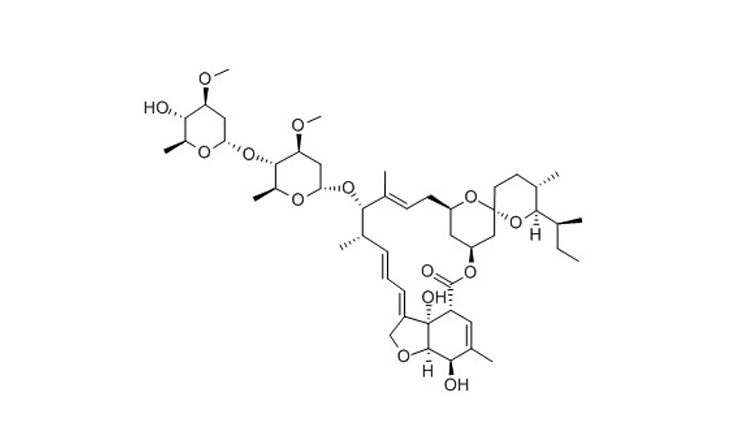Ivermectin is a medication with broad-spectrum anti-parasitic activity. It is used to treat various parasitic infections in both humans and animals. Here’s some information about its chemical structure and physical properties:
Chemical Structure:
Ivermectin’s chemical structure consists of two main parts: a lactone ring and a disaccharide portion.
- Lactone Ring: This is the central core of the molecule, known as an avermectin. It contains a macrocyclic lactone ring, which is crucial for its biological activity. The lactone ring is made up of 16 carbon atoms.
- Disaccharide Portion: Attached to the lactone ring is a disaccharide moiety composed of two sugar molecules (glycosides) – a sugar called mycosamine and a sugar called forosamine.
Molecular Formula: C48H74O14

Molecular Weight: Approximately 875.1 g/mol
Physical Properties:
Ivermectin is a solid substance at room temperature and is practically insoluble in water. Here are some of its physical properties:
- State: Solid
- Color: White to pale-yellow
- Melting Point: Ivermectin does not have a single defined melting point due to its complex structure. It starts to decompose before melting, but the decomposition can occur in the range of 155-170°C (311-338°F).
- Solubility: It is sparingly soluble in water but more soluble in organic solvents like ethanol, methanol, and chloroform.
- Odor: Odorless or slightly characteristic odor
- Density: The density of solid ivermectin is around 1.15 g/cm³.
- Partition Coefficient (Log P): Ivermectin’s Log P value indicates its lipophilicity, which means it has a higher affinity for lipid-based substances than water. This property is essential for its distribution within the body.
It’s important to note that while Ivermectin is well-known for its anti-parasitic properties, its potential for other uses, such as antiviral applications, has been a subject of research and debate. As of my last update in September 2021, Ivermectin’s effectiveness against certain viral infections, including COVID-19, was not conclusively established. Always consult up-to-date and reliable medical sources for the latest information on any medication.
